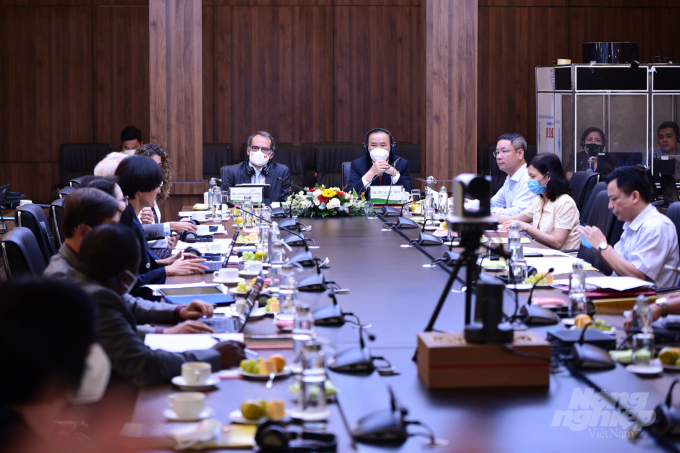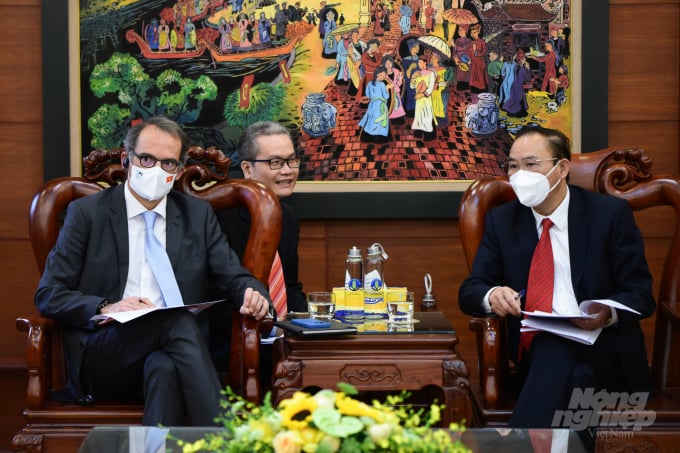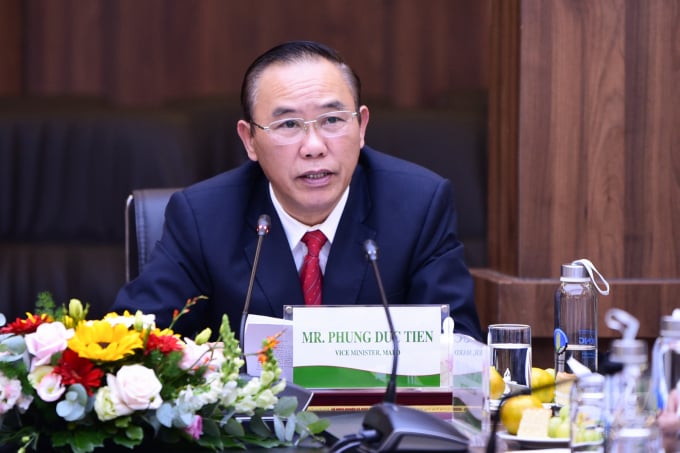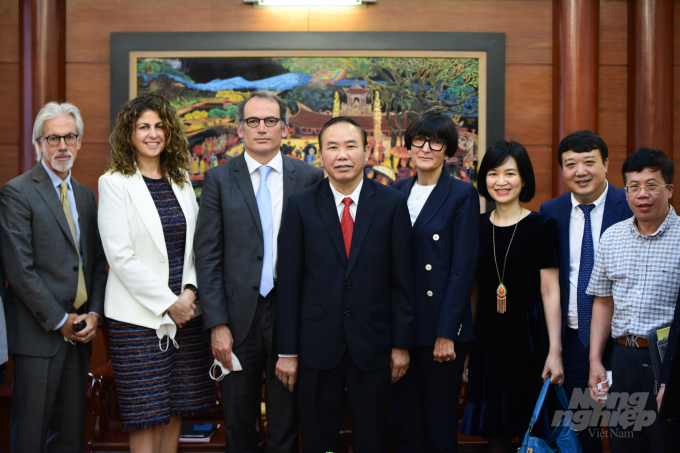May 24, 2025 | 16:22 GMT +7
May 24, 2025 | 16:22 GMT +7
Hotline: 0913.378.918
May 24, 2025 | 16:22 GMT +7
Hotline: 0913.378.918

Deputy Minister Phung Duc Tien and Mr. Alfonso Garcia Mora attended the opening of the forum "The private sector's role in reducing carbon emissions in Vietnam's agriculture and food system". Photo: Tung Dinh.
On April 13, Deputy Minister of MARD Phung Duc Tien and International Finance Corporation's Regional Vice President for Asia and Pacific Alfonso Garcia Mora co-chaired the forum's launch, which was themed "The private sector's role in reducing carbon emissions in Vietnam's agriculture and food system." The leaders then attended a private meeting to discuss future collaboration between IFC and MARD.
Deputy Minister Phung Duc Tien stated during the discussion that MARD leaders highly appreciate IFC's commitment to assisting the ministry in boosting private sector investment in modern, competitive, and environmentally responsible agriculture.
"Low-carbon agriculture is a top priority for MARD because it will help Vietnam meet its commitment at COP26 to achieve net-zero carbon emissions by 2050," Deputy Minister Phung Duc Tien told Mr. Alfonso.
According to the Deputy Minister, the target demands the implementation of environmentally friendly natural resource management strategies, with a particular emphasis on the two highest carbon-emitting industries in Vietnam, livestock production and rice cultivation.
The MARD head highlighted many critical issues facing the sector, including emissions reduction, disease prevention in livestock, biosecurity, and food safety, as well as encouraging exports to high-end markets, utilizing digital technologies in agriculture, and focusing on smallholder farmers.

In a private conversation, Deputy Minister Phung Duc Tien raised the priorities of Vietnam's agricultural sector in the coming time and the issues that IFC can support. Photo: Tung Dinh.
Mr. Phung Duc Tien raised an example of dealing with African swine fever in Vietnam, stating that because there is no vaccine and the fatality rate is 100%, the only answer is to destroy those infected, resulting in a 30% fall in the number of livestock pigs in Vietnam in 2019.
Vietnam is one of three nations participating in the IFC-led regional initiative on African Swine Fever. IFC has helped construct and operate internationally recognized biosafety and disease-free facilities.
Additionally, Deputy Minister Phung Duc Tien proposed that the IFC provide financial and technical assistance in reducing livestock emissions as a resource for implementing solutions to reduce greenhouse gas emissions in livestock; assistance in developing and operating an online database for measuring, reporting, assessing, and inventorying greenhouse gas emissions in livestock. Assistance in the formulation and implementation of Technical Guidelines for the reduction of greenhouse gas emissions in agricultural and rural development, particularly the livestock sector.
"With regards to the pledge made at COP26, we completed proposals for a livestock industry biogas program. This is a high priority for the livestock sector due to the program's benefits and efficacy in resolving environmental pollution concerns, developing clean energy sources, and generating revenue for individuals and the state through credit sales," Deputy Minister Phung Duc Tien noted.

Deputy Minister Phung Duc Tien affirmed that Vietnam needs the vision to transform into a green, low-emissions, and sustainable food system. Photo: Tung Dinh.
Mr. Alfonso Garcia Mora stated that the information supplied by MARD head Phung Duc Tien enables the IFC to obtain a better understanding of Vietnam's and MARD's main goals. "The issues are quite pertinent to the IFC's concerns," the IFC representative stated.
Ms. Rana Karadsheh, Regional Director of IFC, explained that two significant topics might be highlighted at the talks: Africa swine fever and help for smallholder farmers in Vietnam.
Earlier in the forum's launch session, Mr. Alfonso affirmed that the IFC and World Bank had committed to assisting MARD in implementing new programs and implementing IFC recommendations, which included encouraging the adoption of environmentally friendly techniques, reforming the agricultural sector to facilitate the deployment of digital solutions, expanding access to finance for large-scale, high-tech production, and adopting sustainable technology and international standards.

The representatives of IFC affirmed that they will provide technical, consulting, and financial support to Vietnam in the agricultural sector. Photo: Tung Dinh.
"In reality, IFC in Vietnam has taken substantial efforts to assist Vietnam's agriculture transition toward green and low-carbon agriculture through technical assistance activities, consultant services, and financial support," IFC's Regional Vice-Chairman stated.
Deputy Minister Phung Duc Tien stated during this inaugural session that, in addition to sustainable growth, the trend toward green production and consumption with low emissions will continue to dominate the global agriculture and trade markets.
"Therefore, in order to compete on the global stage, we must take bold and visionary steps toward a green, low-emissions, and sustainable food system." The Deputy Minister made a point.
Translated by Linh Linh

(VAN) In the tranquil wetlands of Van Long, there are quiet souls who guard the forests, nurture the waters, and oversee every bird and troop of langurs as protecting the essence of a living heritage.

(VAN) WWF, GIZ, IUCN, UNDP call for biodiversity conservation and sustainable development must be regarded as a unity in strategies for a green future.

(VAN) On celebration of International Day for Biological Diversity, Deputy Minister Nguyen Quoc Tri called for practical actions to address nature and biodiversity conservation.

(VAN) Dr. Hoang Thi Thanh Nhan – Deputy Director of the Nature and Biodiversity Conservation Agency – highlighted this on the International Day for Biological Diversity, May 22, 2025.
![Ho Chi Minh city adapts to climate change: [2] Accelerating action](https://t.ex-cdn.com/nongnghiepmoitruong.vn/608w/files/chiqk/2025/05/22/4024-4220-bien-doi-khi-hau-1-100626_766.jpg)
(VAN) Clearly recognizing the challenges posed by climate change, Ho Chi Minh city has swiftly shaped its policies and implemented practical solutions to adapt.

(VAN) Rice straw is no longer just a discarded byproduct, but it is becoming a green resource that helps farmers in the Mekong Delta reduce emissions and promote circular, sustainable agriculture.

(VAN) Other Effective Area-based Conservation Measures (OECMs) are solutions that contribute effectively to achieving the goals of the Kunming–Montreal Global Biodiversity Framework.